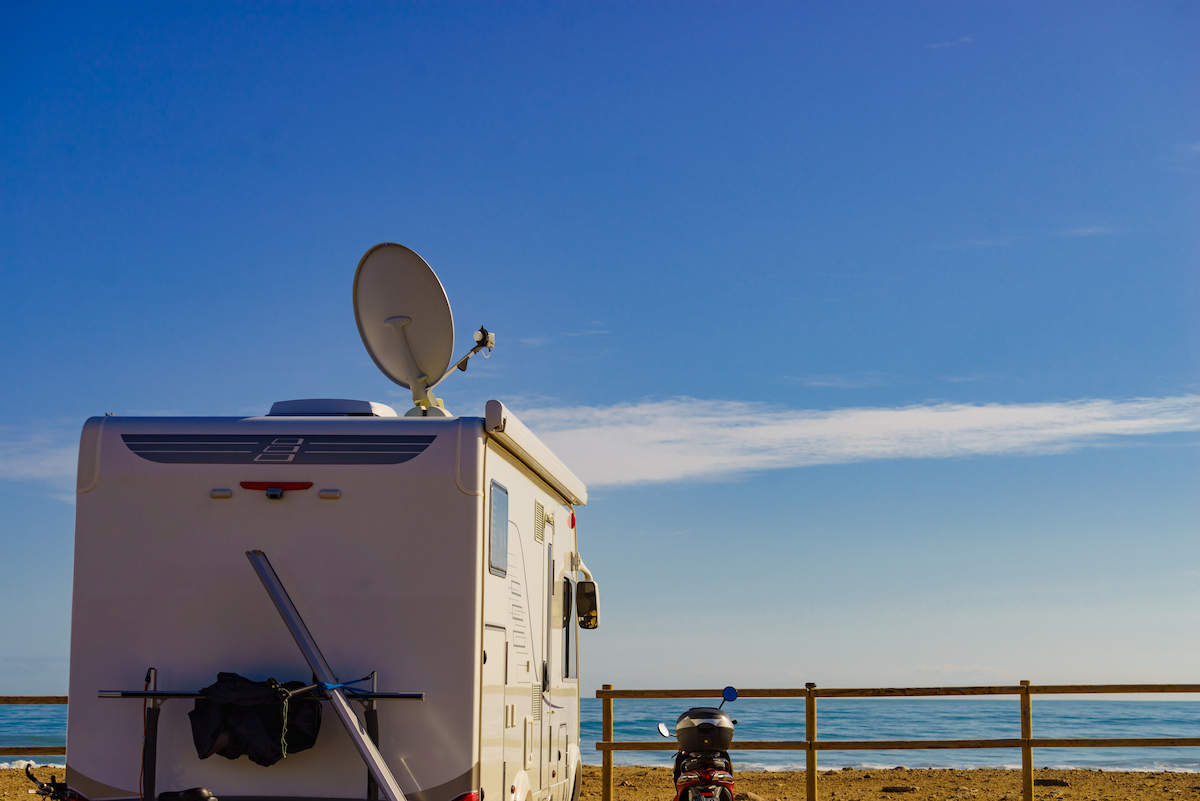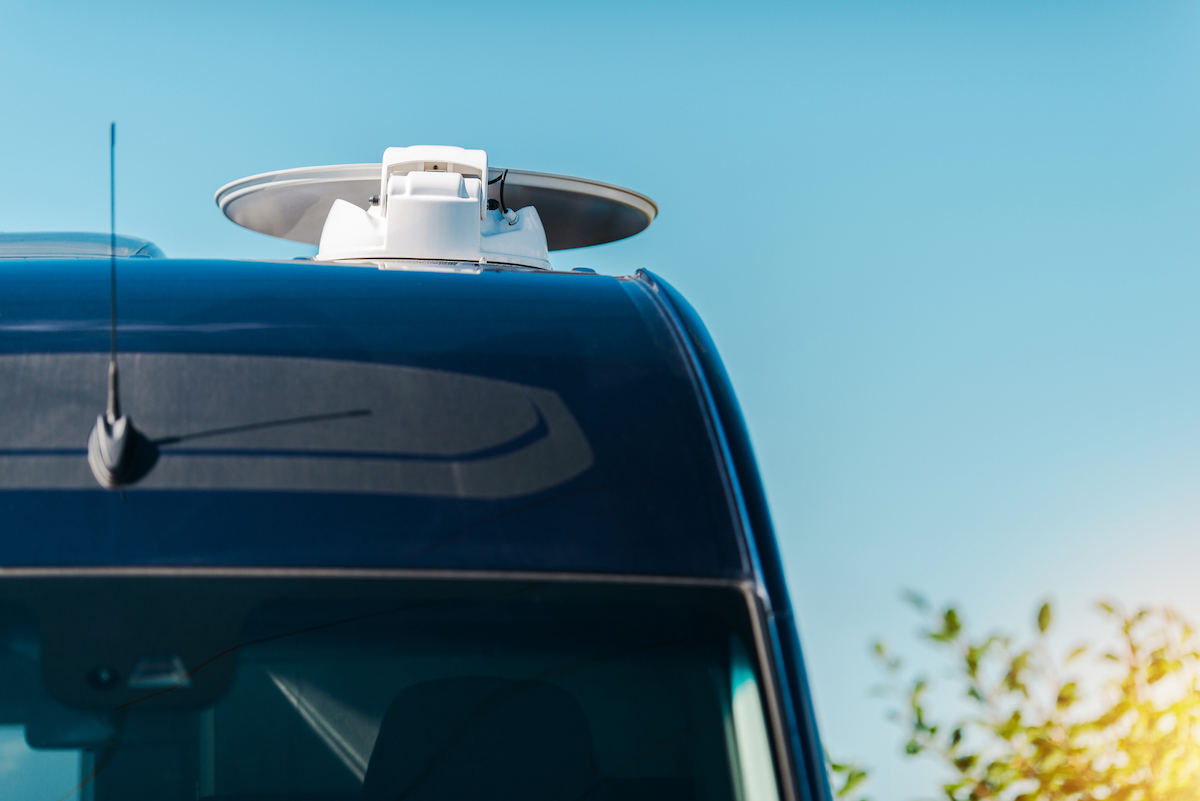Everything You Need to Know About Satellite Internet in Your RV
Satellite Technology Can Keep You Connected Everywhere You Roam, but it Does Come with Some Challenges
Image Caption: Image Courtesy of Starlink
Whether you live in your RV full-time, use it for work on the road, or just go camping on the weekends, having an internet connection is a game changer. Today, the internet isn’t just a way to communicate with friends and family but is also essential to our productivity and entertainment.
But staying connected while traveling isn’t always easy. Many RVers rely on the Wi-Fi provided at a campground or use mobile hotspots connected to cellular networks. Those options are very handy when available, although they can often be slow, crowded with users, and unreliable. And if you happen to enjoy camping at a remote location, they may not be available at all.
Fortunately, there is another option that works well just about anywhere you roam. In recent years, satellite internet has become faster, more reliable, and more affordable. But is it the right solution for you? Read on to find out.

Photo Credit: SpaceX
What is Satellite Internet?
As its name implies, this type of internet service uses satellites in Earth orbit to keep users connected. Rather than data getting transferred over terrestrial fiber optic lines, coaxial cables, or wireless cellular networks, the information is transmitted to a satellite before being beamed back down to the user. A satellite dish receives the data, which is then processed by a router, just like regular home internet service.

Photo Credit: aapsky/Getty
What are the Advantages of Satellite Internet?
The obvious advantage of this type of connection is that it can be used just about anywhere. The user can stay online, even when living or camping in a remote location, far away from the nearest urban environment. A satellite dish is required to send and receive data, but that device can be packed up and moved to a new location as needed. This allows RVers to maintain a reliable connection no matter where they go, even in places where traditional internet infrastructure is sparse or completely nonexistent.

Photo Credit: Voyagerix/Getty
Are There Any Disadvantages to Satellite Internet?
There are some downsides to using satellite internet. For instance, these services don’t offer download speeds as fast as a terrestrial connection. Prices can be quite high relative to the speeds provided too. And if you’re using a standalone satellite dish—as opposed to one built into your RV—you’ll need to redeploy it at each campsite, which takes time and effort.
In order to take advantage of satellite internet, you’ll also need a clear view of the sky. If your RV is parked under or close to tall trees, it can be challenging to establish a connection. Bad weather can also cause the service to drop, which can be frustrating at times.
One of the other drawbacks of older satellite internet systems is that you can’t use them while moving. This is changing with newer services such as Starlink, which does function in vehicles, even when in motion. The equipment needed to maintain such a connection is costly, but it does ensure consistent and relatively speedy service even while driving.

Image Courtesy of SpaceX
Who Offers Satellite Internet Service and How Much Does it Cost?
Over the years, several companies have offered satellite internet services for use at home and in an RV. The most prominent of those as of this article are HughesNet and ViaSat.
Those two brands have been around for years and use satellites parked in geosynchronous orbits to provide an internet connection just about anywhere. Subscribers of HughesNet generally see consistent speeds of about 25 megabits per second (Mbps), while ViaSat data connections range from 12-100 Mbps depending on location and the equipment used.
In 2022, Starlink launched its service for RVs utilizing a network of smaller satellites operating in low-Earth orbit. Because the company’s satellites use newer technology and are in orbit closer to the planet, they provide speedier internet. Customers can expect speeds of up to 200 Mbps, even when traveling in remote locations, which compares favorably to many home internet connections.
It is important to note that several other satellite internet providers hope to launch their services in the coming years. For instance, Amazon is building its own network called Project Kuiper, while Canadian company Telesat is doing the same. Both options promise faster and more reliable connections, although neither of those options will be available until 2024 at the earliest.

Photo Credit: Anetlanda/Getty
How Much Does Satellite Internet Cost?
As you would expect, the price of satellite internet varies by provider. For Starlink, the cost is $110/month for residential service, with RVers paying an additional $25/month for the option to take their connections with them on the road. Users can also pause or unpause the service at any time, although it is always billed in one-month increments. That level of flexibility isn’t typcial with most internet service providers.
Pricing is a bit murkier for the other satellite internet companies. For instance, HughesNet sells its service plans based on how much data users expect to use each month. The lower the plan, the less data that is allocated. The company offers 15 GB, 30 GB, 50 GB, and 100 GB options, with prices ranging from $65/month to $175/month. Each tier offers the same 25 Mbps download speeds, but if customers exceed their data cap, the connection is throttled back to 1-3 Mbps.
ViaSat offers its service at a variety of prices based on connection speed. Customers can select between 25, 50, 75, and 100 Mbps options. Each tier has a data cap, which, if exceeded, results in throttled speeds. These data caps are higher than those found on HughesNet plans, however. Prices range from $50/month to $200/month.
It should be noted that both HughesNet and ViaSat frequently offer discounted plans and promotions that can reduce the price, at least for an introductory period. Starlink has yet to provide any discounts for its service.

Image Courtesy of Starlink
How Much Does the Equipment Cost?
In addition to paying a monthly fee, you’ll usually have to make a one-time purchase of satellite internet equipment too. Typically that means buying a satellite dish, which should come with all the required cables and a wireless router to share the connection across multiple devices.
As with its service plans, Starlink offers the clearest pricing on equipment. The company’s standard satellite dish is priced at $600 and includes built-in technology to align the device with the satellites overhead. The company also offers a receiver that can be permanently mounted on an RV and used while the vehicle is in motion. That device costs $2,500.
Because HughesNet and ViaSat have been in business longer, several companies make satellite dishes and receivers for their services. Some RV manufacturers even ship vehicles from the factory with the equipment already installed. Typically, a standard dish will cost around $300, although prices can range as high as $3000 depending on the model. Many are made specifically for use while camping and can be permanently mounted on the roof of an RV.

Photo Credit: Welcomia/Getty
What Can You do with Satellite Internet?
Satellite internet usually provides the same level of utility as the internet connection that you have at home. That means you can send emails, post photos to social media, make Zoom calls, surf the web, and stream videos from Netflix and YouTube. In other words, you can do pretty much the same things you would do at home while in your RV.
That said, the connection’s speed and latency will impact the service’s quality, especially when watching movies and television shows or playing online games. Generally speaking, faster download speeds make for a better experience, particularly if you share the connection with multiple users and devices. And just like at home, you can still have network outages and slower speeds from time to time.
It is important to remember that if your satellite service has data caps, your connection could be throttled back to much slower speeds, making it less useful. Essentially, if you exceed your data allocation for any given month, your transfer rates will drop until the start of the following month. Using email and surfing the web doesn’t use much data, but streaming video can quickly chew through your data cap. Keep that in mind when choosing a service and deciding how you use it, especially if you live in your RV full-time.

Photo Credit: welcomia/Getty
Is Satellite Internet Service Right for You?
Now that we have a better understanding of what satellite internet service is and what it brings to the table, the question remains—is it right for you? For most RVers, the answer is probably no. With Wi-Fi service included at most campgrounds, a satellite connection can be a pricey luxury that isn’t necessary. Add in the fact that most of us already have a cellular data connection through our smartphones—which can often be tethered to other devices—and our internet needs are usually well covered.
On the other hand, if you frequently camp in remote places or find campground Wi-Fi to be slow and unreliable, satellite internet is a compelling alternative. Remote workers may also prefer their own dedicated service that they can use as needed. The versatility and reliability of this type of connection is hard to beat, provided you don’t mind paying the monthly fees.
That’s essentially everything you need to know about satellite internet service. Hopefully, you now have a better understanding of what it is and how it can help you to be more productive and happy on the road.

Kraig Becker is a writer in the RV, outdoors, and adventure travel space. Over the course of his career he has contributed to such outlets as Popular Mechanics, Outside Online, Business Insider, TripSavvy, Digital Trends, GearJunkie, The Adventure Blog, and countless others. And avid runner and cyclist, he enjoys camping, hiking, mountain biking, kayaking, and just about any other outdoor activity. His travels have taken him to seven continents and on many amazing adventures.





